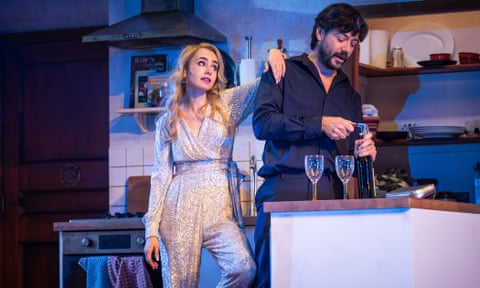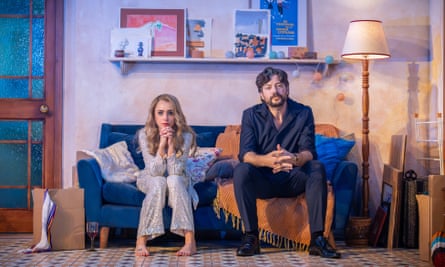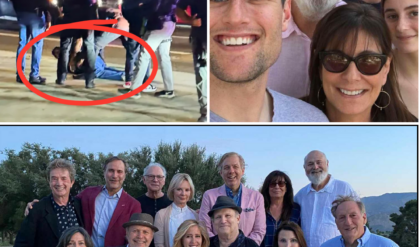The stars of Emily in Paris and Money Heist team up for a curiously flat drama mixing suspense, comedy and politics.

Emily in Paris star Lily Collins makes her stage debut by stepping into not a French garret – or even a Roman apartment – but a flat in the Catalonian capital in Bess Wohl’s play. It is quite the entrance. Wearing a spangly jumpsuit with a sash, and missing one of her high heels, she portrays US tourist Irene, who has hooked up with Manuel (Álvaro Morte from Netflix’s Money Heist) in a tapas bar. The pair stumble in through the front door, snogging and cackling, Irene pausing to take in a view of the Sagrada Família and try out her Spanish phrases. Soon, they’re on the kitchen counter: “Olé!”
The play commences as frothy comedy, but anyone who saw another Wohl two-hander, Camp Siegfried (at the Old Vic in 2021), will not be surprised to soon encounter darker currents. Irene is younger and considerably drunker than Manuel, who also has an advantage of home turf. When she heads into his bathroom, he calmly sits, rolls up his sleeves and eyeballs the audience.
But in Lynette Linton’s production neither the suspense nor the humour hit home, the mix often more awkward than unsettling. The biggest in a handful of plot revelations lacks emotional impact and does not so much shed light on earlier events as render them distractingly implausible. Given the considerable creative talent involved, this is a curiously flat affair, feeling longer than its interval-free 90 minutes, with little sense of these strangers being transformed by a shared experience. While the performances are agreeable, it is hard to invest in either character – quite the contrast to Linton’s sparky staging of Benedict Lombe’s Shifters, which immediately preceded Barcelona at this address.

As the pair’s conversation veers between teasing and quarrelling, so do the gestures: intimacy and movement director Shelley Maxwell oversees physical encounters that include Morte fervently licking Collins’s feet and sucking her toes, as well as the couple squaring off over politics. Manuel rages against American exceptionalism – with shade cast on Irene’s ignorance of Spanish culture (she even repeatedly gets his name wrong). He deplores the US-led invasion of Iraq and mourns the casualties of the Madrid train bombings of 2004 which, five years later, still haunt him.
And this is a haunted-house story of sorts (leading to some superfluous shadowplay towards the end). The building is about to be torn down, and Frankie Bradshaw’s set of muted colours and generic decorations reflects the limbo state of both characters, its anonymity initially matching Manuel’s enigmatic air while Irene talks a mile a minute. Her drunken plea to “pretend it’s the last night on Earth” is refracted throughout, as Wohl explores last hurrahs, poignant farewells and all sorts of endings. There are probably too many of them piling up, and the drama is also weakened by overexplaining the significance of, for example, Manuel playing an aria from Gianni Schicchi or the unfinished symphony of Sagrada Família. Irene is given a speech about living life like a tourist after the point has already been made.
There is an ambitious attempt here to interweave how we find our bearings in family histories and global politics. But that balance, much like the bittersweet tone of Wohl’s elegiac drama, remains elusive in a production that carries its own what-might-have-been disappointment.
At Duke of York’s theatre, London, until 11 January





